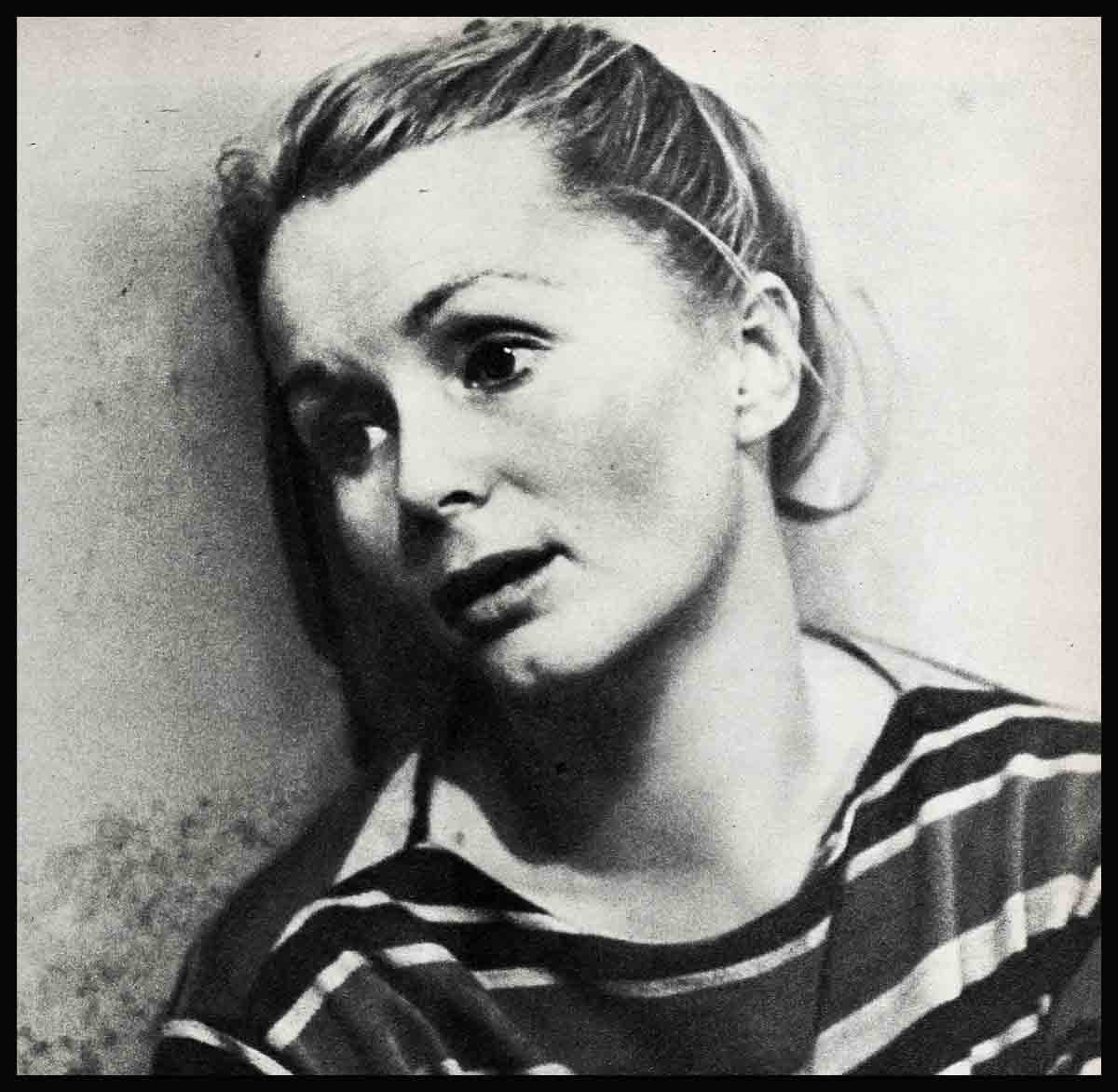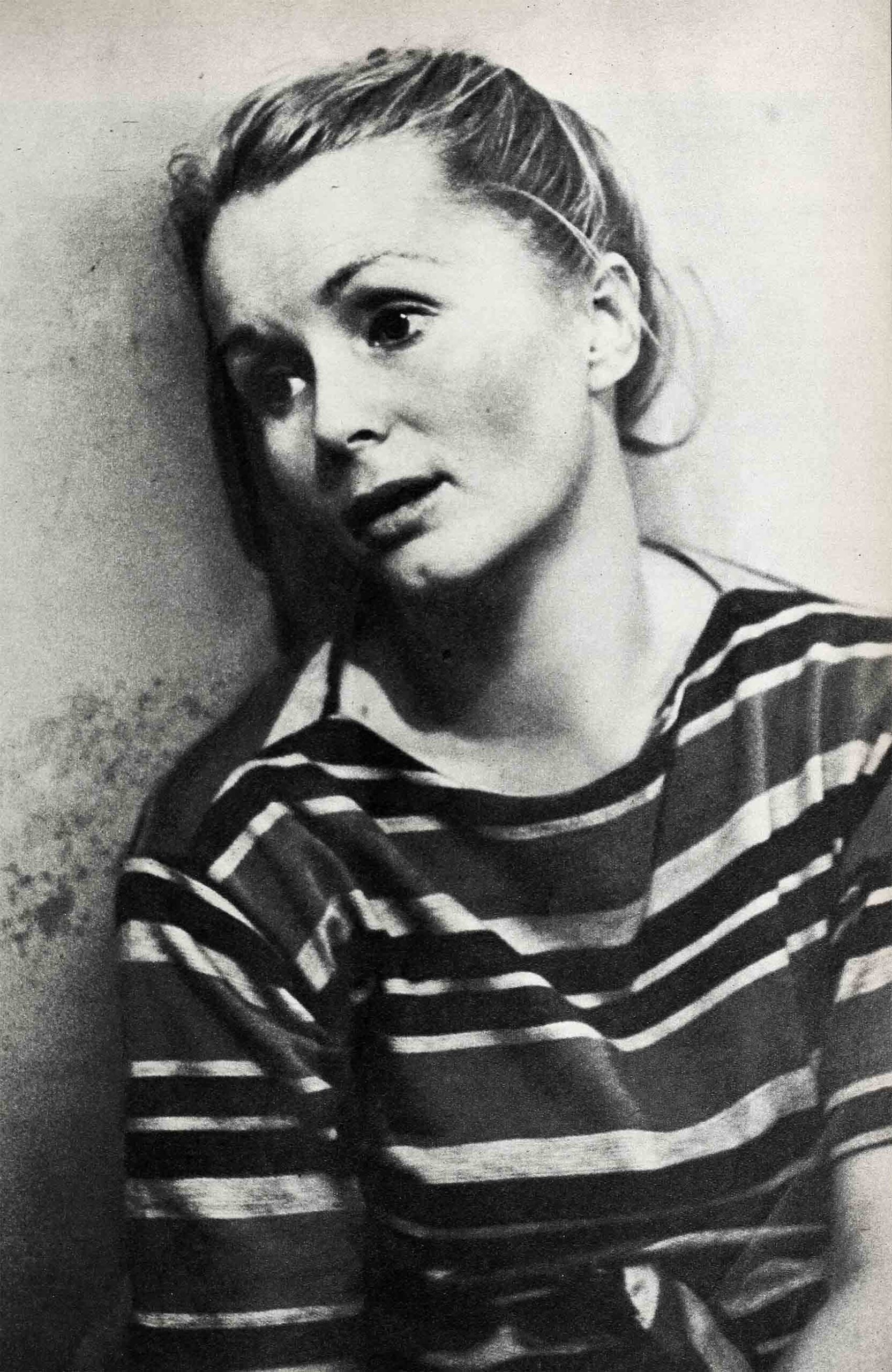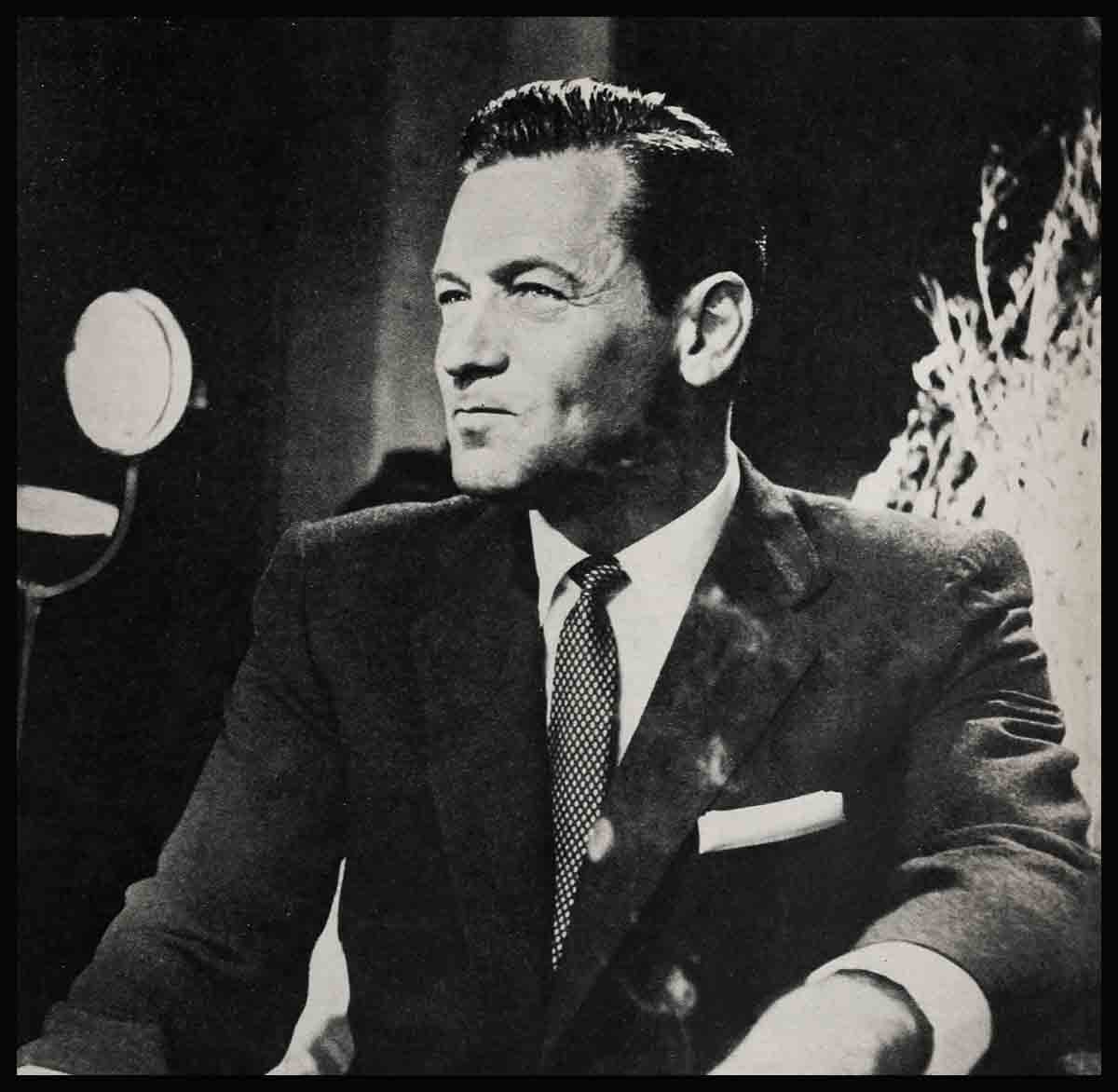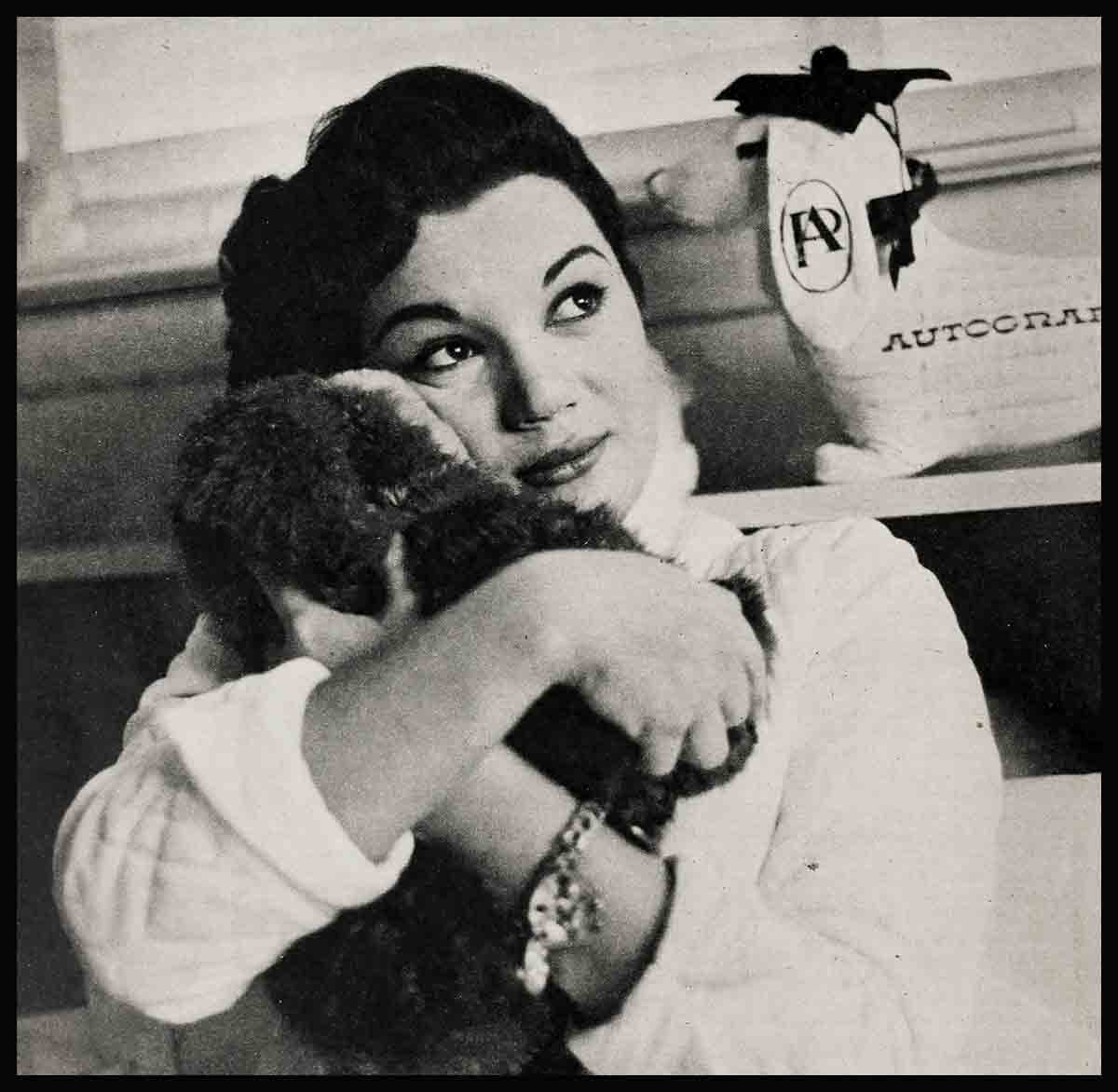
Debbie Reynolds Loses Second Baby! Can She Have Another?
“I don’t think i can talk about it too much ” This was Debbie Reynolds, sad-voiced and near tears, talking for the first time on a subject that had submerged her and Harry Karl to the depths of depression, the loss of their second baby.
I had reached Debbie by long-distance phone at her home in Palm Springs. It was just a few days after she had returned from St. Joseph’s Hospital in Burbank, where she had lost the baby she and Harry had wanted ever since their marriage.
At first, I didn’t believe Debbie could talk at any length about her loss. She was so choked up. But I was surprised by the sharp change in her tone. “I know you called all this distance to get a story, so tell me what you want to know . . . I’ll try to answer you,” Debbie said. All at once she seemed to want to talk about the latest tragedy in her life.
I thought back to the last time I spoke to Debbie. It hadn’t been more than a few weeks since I saw her in New York City, just before she and Harry sailed off on their European trip. I’ll never forget the scene. There were reporters to the left, reporters to the right. All firing questions. And photographers—well, they were simply bivouacked in every foot of space that wasn’t tenanted by reporters. As flashbulbs popped and questions cascaded on poor Debbie, she tried to chat with me because, after all, it was supposed to have been an “exclusive” interview for me. But, somehow, the press had gotten wind of Debbie’s intention to visit New York, and it was no longer my interview.
Still and all, Debbie—always courteous and thoughtful—did her darndest to answer my questions.
Here is how that session went:
Q. Do you have any fears about losing the baby this time?
A. None at all. The doctor assured me that I can have a perfectly normal childbirth, as I have had twice before. There is no reason now to lose the child. I’m in my sixth month.
Q. You just finished “Mary, Mary” at Warner Brothers. I hear you were required to do some very strenuous routines. Did they bother you in your condition?
A. Not in the least. They were just as you said—routines.
Q. Wasn’t your doctor concerned?
A. Of course he was concerned. He’s always concerned with what I do. But not afraid. He felt that so long as I’m healthy, there’s no reason to be afraid of activity.
Q. You and Harry always tell me that you want eight children—the four that Harry has from his first marriage, the two that you have from your marriage to Eddie Fisher, and two more you want out of your marriage to Harry. . . .
A. Yes. We’d like a boy and a girl. And we don’t really care which comes first, as long as the other one follows.
Q. Suppose they turn out to be two of a kind, like a girl and another girl. Will you go for three then?
A. That’s a bridge we’ll have to cross only when we get to it.
Debbie then threw her head back and broke into a glorious smile. Her eyes glistened beautifully in the reflection of the many lights and exploding flashbulbs.
“Is that all you want to talk about—babies?” Debbie asked.
I told her that I had brought along a long list of questions—numbering exactly thirty—that the editors of Photo- play had drawn up. The questions ranged over a wide area. They touched on Debbie’s and Harry’s plans on having children, about how Debbie is raising her own two children from her marriage to Eddie, how often Eddie visits the kids, about Harry’s children, about religion, etc., etc., etc.
“Let me see the list,” Debbie said, almost demandingly.
“You won’t tear it up?” I asked, betraying a slight apprehension.
“Of course I won’t, silly. I’m just curious to see what the editors want to find out about me.”
I handed over the sheet of questions.
“Mmmmm,” she murmured. “It’ll take a year to answer all these questions. And I certainly couldn’t even begin to answer some of them here.”
Indeed not. The other reporters, incredibly enough, had given us this period of privacy to discuss Debbie’s baby. But they couldn’t be held at bay any longer. Even columnist Earl Wilson was champing at the bit to get at Debbie.
“Please let me do this,” Debbie pleaded. “Let me take the questions along. . . . I’ll have time to read them on the ship, and I’ll write out the answers. Then I’ll mail them back to you. That’s what I’ll do.”
By now the other wolves of the Fourth Estate were beginning to pound Debbie with queries. Things got so hectic that I had no alternative in this impossible situation. Time, too, was against us. Debbie had to sail the next morning.
“Okay. Debbie,” I said yielding. “Here’s the list. Mail it to me.”
Debbie took the paper, folded it neatly, and slipped it into her pocketbook.
Something like six weeks had passed when I talked with Debbie again. Sadly, I must report, Debbie never sent the list back answered. So, as I talked with her now, I asked what happened.
“You’ll never believe it,” Debbie said, her voice almost normal at last, now that we had gotten off the subject of her lost baby—for the moment. “I was so busy having fun that I completely forgot . . .”
There was a long pause on the phone.
“You know,” Debbie finally said again. “I really hate to write answers to questions. I much prefer that you ask me in person about these things.”
“All right,” I said. “Then let me ask you some questions about the baby—if you don’t mind talking about it, that is.”
Debbie remained silent briefly. Then I heard a big sigh.
“Well. I don’t think I mind too much. If that is what you want to talk about, go ahead.” Debbie said surrenderingly.
“Tell me this, Debbie,” I said as softly as I could, “what do you think is causing your trouble—the tragedy of losing two nearly full-term babies the way you have?”

“If you want the truth, I don’t know,” Debbie replied. “I have talked to my doctor and to other doctors. None can really pinpoint the reason. They tell me that I’m healthy, that I can become pregnant again as I have before without any fear, and that I could probably give birth to a normal baby the next time. But they can find no reason for the last two miscarriages.”
Actually, the first time Debbie lost her baby—in July, 1962—it was not a miscarriage. The baby was still-born. It had been almost fully developed. But it had been delivered dead.
This time, it was not quite a full-term baby. Just six months. So it was considered still a fetus.
“Did you do anything on your trip which might have caused the miscarriage?” I asked Debbie.
“Nothing that my doctor didn’t approve of,” Debbie replied. “Of course I was active. Harry and I went to places and had a wonderful time. But I never over-exerted myself. I felt fine all the time—until . . .”
Debbie’s voice trailed off momentarily. “But God is very big and very great. You know, I’m a very religious person. My attitude is that if it was God’s will that these babies not be born, then I must accept His will. I’m sure He knows what is best for us.”
It was, in fact, Harry Karl who told me the details of how the baby was lost. “We were in Rome,” he said, “I had finished my business there and we were going to leave in a day or two. Then Debbie got up that one morning and she didn’t look right. I asked what was wrong. She said she didn’t know, but she didn’t feel well. I asked if she was in pain. She told me she wasn’t.
“ ‘I just don’t feel right,’ she said. Then, ‘Harry, I think we’d better go home. I want Dr. Levy to examine me . . .’
“I knew then what Debbie apparently feared. I didn’t hesitate. I made arrangements at once and we flew over the Polar route to Los Angeles.”
Harry said that Debbie went to see her physician. Dr. Charles Levy, the very instant they arrived on the Coast. “We got the bad news from Levy,” he said. “He ordered Debbie into the hospital at once—and that was that.”
Harry told me that the loss of the baby was sad for him—as well as for Debbie—but that they would not be deterred from trying again.
When I was talking with Debbie, I brought up the question of whether she felt as Harry did about trying for another baby. Or for two, as they had always said they wanted.
I suddenly found myself talking to that bubbly, bouncy, breathless Debbie Reynolds of old once again.
“Yes, of course,” she trilled. “We haven’t changed our plans at all. In fact, we’re as determined as ever, if not more so, to expand our family. I’m deeply in love with Harry and I want to bear his children more than anything in the world. I know that a baby will bring real fulfillment to our marriage. But I can’t say that even without children my marriage to Harry has been anything less than real fulfillment to me.”
I wanted to know how Harry felt.
“Disappointed,” Debbie answered. “And I don’t feel any less frustrated than Harry. I wanted so much to give him a son—he has wanted a boy so badly.”
There was a pause.
“And do you know what?” Debbie continued. “I’m going to give him the boy that both of us want so badly. . . .”
Our interview ended then, but the story wasn’t quite finished. I also had to consult one of the East’s most renowned obstetricians and gynecologists.
Naturally, when I saw him, the doctor could not be expected to comment specifically on Debbie’s tragic losses. Nevertheless, he was able to discuss the case in broad general terms, as it might apply to almost any couple in Debbie and Harry’s position.
Let’s take Harry first. I told the doctor there was some suggestion that Harry, perhaps, might be a source of the trouble. I pointed out that there is an age span of eighteen years between Debbie and Harry, who is, as it happens, in his late forties.
Don’t blame Harry
“If you are suggesting that there could be a weakness in the husband’s physical condition or capability, you are wrong,” the doctor told me. “This man has already fathered four children. And he is still at an age that, for a man, is considered quite young.
“I can cite numerous cases of males who have fathered children—not in their late forties, not in their fifties or sixties, but in their seventies and even eighties. Leopold Stokowski and Charlie Chaplin are classic examples among men in the spotlight who, despite their advanced years, have become fathers.
“Only the woman is affected by advancing years. She cannot give birth because she cannot conceive—and that results from the fact that she cannot ovulate.”
I brought up the rugged routine that Debbie had been subjected to during movie-making.
“Yes and no,” the doctor said. “Overactivity could sometimes be a factor, but there again it depends on the woman. A severe emotional crisis is more likely to hurt her than physical exertion. We usually advise them early in their pregnancy as to how they must conduct themselves, how much physical activity they can handle.
“Women by nature are strong creatures. And if they are normal and healthy, if they have no inherent weakness in their pelvic region, or do not suffer some other physical inadequacy, we do not set limitations on their daily routines.
“I myself advise my patients to keep on working—if they have jobs—right up to the moment they have labor pains. They are better off when they are occupied. I’m quite certain that the doctor who examined Miss Reynolds must have found her physically capable of with-standing the stresses and strains of picture-making. If he hadn’t, he would have advised her to take it easy—even quiet, until she had the baby.”
Then, if all this was true, why did Debbie—a healthy woman who twice before bore children—suddenly lose two babies in a row?
“That’s a question that no doctor in the world can answer, unless he has examined the patient—and conducted a thorough autopsy on the child. But even then the odds are very much against a positive determination. More than likely, the autopsy will not reveal any clue to why the baby wasn’t born.
“Sometimes, tragically, when a baby is overactive in the womb, it will turn and strangle itself by winding the cord around its neck. There is nothing we can do to prevent such an occurrence. It’s simply one of those unfortunate things.
“But that is only one of perhaps 5,000,000 reasons why a baby can die before it is born. So much is involved.”
Can they have a child?
I asked the doctor for his opinion—based on the background on Debbie and Harry I’d given him—on whether they could eventually have the child, or children, they so greatly desire.
“The facts indicate they are both highly capable of becoming parents. The very fact that Miss Reynolds gets pregnant shows she has a healthy pelvis and that her ovaries ovulate—they produce eggs.
“Unless there are some hidden causes, such as physical diseases like diabetes and high blood pressure, or a number of others that have an adverse influence in pregnancies and childbirth—there is no reason why she cannot bear well-formed, healthy children. And I’m sure that if there were any such malfunction in her system, her doctor would not only have detected it, but also advised her of its existence and treated her accordingly to insure a normal birth.
“Her case, from what I see of it, doesn’t appear to be any different from the countless others in this country and elsewhere in the world in which mothers lose their babies before birth—for no apparent reason.
“It’s unfortunate, but explanations in the majority of these instances are hard to come by. It’s just one of the mysteries that constantly surround the miracle that is childbirth.
“I can see no reason why Miss Reynolds and Mr. Karl cannot have the children they want. . . .”
And that was precisely what Debbie’s own doctor told her.
More importantly, that was what Debbie told Photoplay—she and Harry are go- ing to try again.
—GEORGE CARPOZI, JR.
See Debbie in “My Six Loves,” Para., “How The West Was Won,” M-G-M, and Warner Brothers’ picture, “Mary, Mary.”
It is a quote. PHOTOPLAY MAGAZINE SEPTEMBER 1963





zoritoler imol
31 Temmuz 2023We’re a group of volunteers and opening a new scheme in our community. Your site offered us with valuable info to work on. You have done an impressive job and our entire community will be thankful to you.